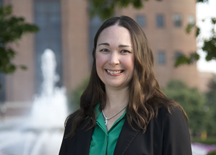Purdue Peace Project helps resolve leadership conflict in Berekum, Ghana
October 31, 2013
 |
|
Stacey Connaughton, an associate professor of communication, is director of the Purdue Peace Project, which is housed in the Brian Lamb School of Communication and the College of Liberal Arts. This research project is focused on resolving conflict by empowering local communities and its citizens to resolve the problem on its own rather than outside groups coming in to provide solutions, resources or financial assistance. (Purdue University photo/Mark Simons) |
WEST LAFAYETTE, Ind. - After 13 years of conflict over who was chief of a small Western African community, local citizens were able to help peacefully resolve the disagreement with the assistance of a new Purdue University peace and research program.
The Purdue Peace Project, housed in the Brian Lamb School of Communication and the College of Liberal Arts, works with local citizens in West Africa to help prevent political violence in their communities. The program's first success story is from Berekum, Ghana.
"Historically, when there is a conflict in a region, outside groups come in to offer financial assistance, resources or solutions, but what makes the Purdue Peace Project different is empowering the local community and its citizens to resolve the matter on its own," said Stacey Connaughton, an associate professor of communication and project director. "It's not about what the Purdue Peace Project does to fix the problem. We provide space and opportunity for the local actors to resolve the situation through effective strategies and dialogue."
In Berekum (pronounced Bear-a-KUUM), a municipality of just over 83,800 people, the chief is nominated by the queen mother and accepted by the kingmakers before being installed. The chief is an important figure in Akan custom, being viewed as the source of all traditional authority.
However, in 2000, a chief was installed, some believed, without following the proper process for nomination and installation. As a result, that individual was not officially recognized by some citizens as the traditional leader, and he could not fully exert his authority as he had not been deemed the paramount chief by the state, Connaughton said. The community struggled with development, education and infrastructure concerns. After a decade of problems and with the December 2012 Ghana parliamentary elections approaching, there was concern about possible political violence and destruction.
The Purdue Peace Project became involved in January 2012, and on Sept. 9, 2013, Berekum announced it had a new, approved chief.
The project began with a meeting of relevant community leaders, including those who supported the chief, representatives of religious communities, the youth and other community groups.
"Allegiances were split, but one thing that remained true was that people were committed to avoiding violence. Once a judicial decision was made, all said they would abide by the decision," Connaughton said.
During the first phase, issues and concerns were identified and an action plan developed with the goal of preventing political violence. From these initial efforts the Berekum Peace Committee, composed of only local citizens, was formed and continued with more meetings, designing messages of peace, advocacy efforts, peace marches and local media reports to help avoid violence.
"This group really made a difference," Connaughton said. "Our goal is for the Purdue Peace Project to always be in the background. Local leaders should be driving the solution."
Throughout the project, the research team collects data and interviews people about the conflict and process to resolve it. Connaughton, whose research expertise is in leadership processes and issues of identification, leads the team, which is composed of graduate students and a program manager, Rosaline B. Obeng-Ofori, who resides in West Africa.
Now that the chieftaincy dispute is resolved, the team will follow the transition period in Berekum, and also continue working with communities in Liberia and Nigeria to resolve community conflicts. One initiative in Liberia concerns citizens' limited participation in natural resource management issues, and the second focuses on a dispute between the community and the growing number of pen-pen drivers, many of whom are former child soldiers who use dirt bikes as messenger and taxi services. There is no infrastructure or regulations in place and often there is conflict as these former soldiers adjust to civilian life. The Purdue group also is working to improve university and host community relationships in a violence-prone region of southern Nigeria.
The Purdue Peace Project is funded by a Purdue alumnus, Milton C. Lauenstein, who is a retired businessman and philanthropist. The project also works with organizations such as Health Matters Inc., International Alert, Open Society Initiative for West Africa, Rights & Rice Foundation, and Women Movement for Sustainable Development.
Writer: Amy Patterson Neubert, 765-494-9723, apatterson@purdue.edu
Source: Stacey Connaughton, 765-494-9107, sconnaug@purdue.edu

